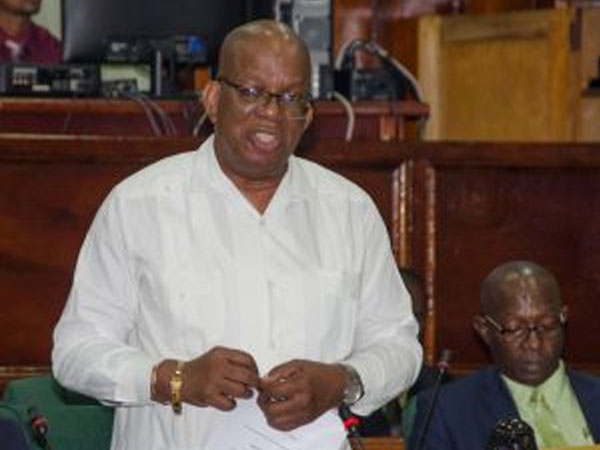 Even as the Guyana government grapples with finding a solution to steadily falling global rice prices that are affecting farmers and millers, economist Winston Jordan is recommending reduced production of the grain.
Even as the Guyana government grapples with finding a solution to steadily falling global rice prices that are affecting farmers and millers, economist Winston Jordan is recommending reduced production of the grain.
He said the bigger rice producers should remain in the business, while the smaller ones should be encouraged to diversify into other productive activities. Mr Jordan reasoned that in a period of depressed prices, there was no justifiable reason to increase rice output, expected to be around 800,000 metric tonnes this year. “It’s an occasion for you to temper production for the time being unless, of course, you’re in Brazil or United States or Australia or Thailand where you have massive silos where you can take off these increase in production and hold for a better time and/or you have a domestic production that adds value to this rice,” said Mr Jordan, a former finance minister and former budget director on the Facebook podcast The Countdown.
He said it would not be feasible to ask farmers to produce yet another “bumper crop” because of inadequate storage capacity in the private sector while government spends another year to install its own silos to buy and store paddy, reminiscent of the Guyana Rice Development Board’s operations several decades ago. “I think we’re just trial by error long after when we should have been able to gain the necessary experience to be able to plan and plan effectively,” he said.
He said it would not be feasible to ask farmers to produce yet another “bumper crop” because of inadequate storage capacity in the private sector while government spends another year to install its own silos to buy and store paddy, reminiscent of the Guyana Rice Development Board’s operations several decades ago. “I think we’re just trial by error long after when we should have been able to gain the necessary experience to be able to plan and plan effectively,” he said.
President Irfaan Ali earlier this month ruled out a slash in rice production, instead saying that the Guyana government would be investing in storage facilities and encouraging a move towards value-added rice products.
Mr Jordan also urged the Guyana government to provide global market information concerning volume and prices for the grain so that they could make the right decisions. “The farmers have to be given information that there is a glut in the world market,” he said. In the absence of adequate rice storage and value-added rice products, he said increasing rice production would always put the government on “the back foot”.
If the slump in rice prices is temporary, he said the grain could be stored in silos but farmers should be told if the forecast shows that the prices would remain low in the long term. “It can’t be right for you to be telling farmers to go and increase production and when they do that, they’re not aware of market conditions internationally,” he added. Against that background, he recommended that “marginal farmers” exit rice and receive government support in another crop while assisting the bigger producers. “The productive farmers, you work with them to improve their productivity even more but the ones, who are marginal farmers and so on, you have to let them know what is happening and assist them into new productive ventures,” he said.
He acknowledged that the Guyana government has “done everything” for rice farmers so far including supplying free fertiliser, removing duties on machinery and equipment, abolishing the Guyana Rice Development Board’s commission, providing cash subsidies to offset the low price, subsidising of crop insurance premiums, and minimally enforcing income and corporation tax collections.
The former finance minister said he would not support any future price subsidies on rice on top of sugar industry subsidies. “There aren’t much more left that you can give to the farmers, except if you increase the price subsidy. This has nothing really to do with the farmer but this is a total misuse of taxpayers’ money,” he said.
The ruling People’s Progressive Party Civic (PPPC) attracts a sizeable chunk of its political support from the rice and sugar sector.
The Ministry of Agriculture on Wednesday said farmers were continuing to “seek government’s intervention to secure higher prices for their paddy.”
Agriculture Minister Zulfikar Mustapha was quoted as saying in a government statement that it was in the best interest of the sector for farmers to benefit from best prices and that the government was actively working to reduce the cost of production. He said approximately GY$2 billion was expended to procure fertilizer for farmers for 2025. Millers reportedly told Mr Mustapha that global markets were becoming fewer and more competitive with large producers like India having huge quantities of rice on the market.
The agriculture ministry reported in its statement that a number of millers said that they were losing given the current world market prices because of their cost of production.
While offers were made for the GRDB to work with millers to assess the cost of production, the ministry said a number of the millers maintained that the cost of production cannot be the determining factor for setting the price farmers receive for paddy.
“One miller also said while one price is set in a contract, those prices change based on the current market price at the time the rice is sold and in order to maintain that market, those prices have to be accepted,” the ministry added.














© Copyright 2025 The SSResource Media.
All rights reserved.